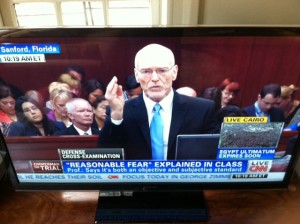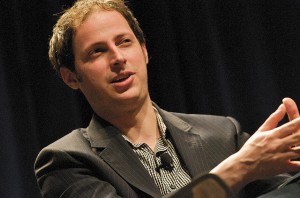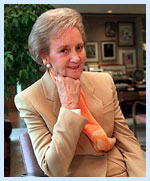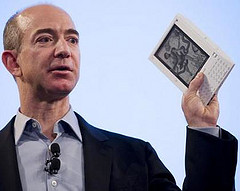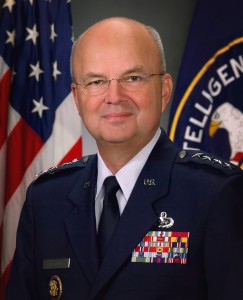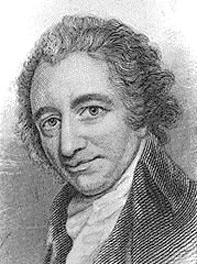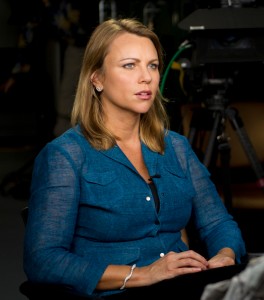Repeal the concept of an informed public, repress your decision to take such a drastic step. But it’s not just Jeffrey Toobin. Congress did it too.
Last week on his CNN program Piers Morgan had just about finished a little speech on how you can’t have any bloke with a security clearance spewing classified information “on a whim” when James Risen, national security reporter for the New York Times, interrupted him: which document that’s come out don’t you want to talk about? Meaning: which of the things we’ve learned from Edward Snowden would you, as a journalist, prefer not to know? Which part of the surveillance story that’s come to light should have remained in darkness?
It was a good question. Piers Morgan did not have much of a reply.
When, on the same program, Jeffrey Toobin of the New Yorker said that public discussion about previously classified materials was “a good thing” but he still thought Edward Snowden was a criminal and shouldn’t have done what he did, Risen interrupted: “We wouldn’t be having this discussion if it wasn’t for him,” he said. “That’s the thing I don’t understand about the climate in Washington these days, is that people want to have debates on television and elsewhere, but then you want to throw the people who start the debates in jail.”
It was a sharp observation. Jeffery Toobin didn’t have much of a reply.
The exchange begins at 7:30 on the clip below:
Ever since The Guardian began to publish its revelations from the files of Edward Snowden, I have been trying to frame the unanswered question that drives my own interest in the subject.
Disclosure: I am not pro-Snowden or anti-Snowden, because to put it that way unnecessarily personalizes the issue. I am not “for” the National Security Agency or against it. As a U.S. citizen I am implicated in what the NSA does, and I want it to succeed in discovering those who would harm us. My concern, as a writer and journalism professor, is with another fight: the one for public knowledge, for sunlight, for the facts to come out so we know what’s going on. I am primarily interested in the journalism that Edward Snowden has set in motion, and the gains in public knowledge that have resulted from his actions, which I have called the Snowden effect.
The question that bothers me most can be put this way:
Can there even be an informed public and consent-of-the-governed for decisions about electronic surveillance, or have we put those principles aside so that the state can have its freedom to maneuver?
I call it unanswered but it’s more than that. It’s like we can’t face it, so we choose not to frame it that way. The question is less unaddressed than it is repressed by a political system that can’t handle the weight of what it’s done. But now that system is being forced to face what happened while it wasn’t looking— at itself. I will show you the problem by quoting four writers who have touched on it. Apologies for the long quotes. But if you can follow me through them, there will be a payoff (in pressthink) at the end.
1. Everything from everybody
Fred Kaplan is on the war and peace beat for Slate. (He also has a PhD in political science.) Here he explains “how the NSA traveled down a slippery slope.”
“At first, they focused on tracking traffic patterns. Some phone number in the United States was calling suspicious people or places in, say, Pakistan. It might be useful to find out whose phone number it was. It might then be useful to find out what other people that person has been calling or emailing, and then it might be useful to track their phone calls and email patterns. Before you know it, they’re storing data on millions of people, including a lot of Americans. Then maybe one day, they track someone—a phone number or email address they’d never come across before—engaged in some very suspicious activity. They wish that they’d been tracking this person for some time, so they could go back and see if a pattern exists without having to wait for one to emerge. Then they learn that they can do this; new technology makes it possible. So they scoop up and store everything from everybody. They even convince themselves that they’re not ‘collecting’ data from American citizens (as that would be illegal); no, they’re just storing it; the collecting doesn’t happen until they actually go retrieve it from the files.”
Somewhere on the slope it slid down, the NSA realizes it has to get legal authority to collect it all. Kaplan explains:
So they ask the FISA court—created by Congress in the 1978 Foreign Intelligence Surveillance Act—to rule on whether this is permissible, and the court complies. Specifically, it rules that they can do this, as long as the material they’re storing is “relevant” to an investigation of terrorism, and the court buys the logic that the agency might need to go fetch data retroactively in such a probe. Therefore, everything is “relevant.”
The catch, as we now know, is that all of this—the ever-expanding surveillance in time and space, the reasoning behind it, and the FISA court ruling that approves it—has evolved at such high levels of secrecy that only a handful of people in Congress (very few people anywhere outside the NSA, and probably not all that many inside) know anything about it. This, it turns out, is what [Ron] Wyden, a member of the Senate Intelligence Committee, meant when he cryptically said, way back in October 2011, that “there are two Patriot Acts in America”—the one that anybody can read and a “secret interpretation that the executive branch uses” but that nobody on the outside knows about at all. The public Patriot Act allows “bulk” collection of data; the secret interpretation defines “bulk” far more bulkily than anyone could have imagined.
And here’s the problem. The program was supposed to have checks and balances, but really it doesn’t, not anymore.
“They scoop up and store everything from everybody.” The American public didn’t know about that. The American people never voted for that. It’s doubtful that, sufficiently informed, public opinion would consent to that. Even so, it’s possible to argue that “consent of the governed ” was maintained because key committees in Congress were informed. Congress also created the FISA court and gave it these powers.
But that’s not enough. “Blind” consent can easily be abused. The only possible check on that is public knowledge and open debate. Not for everything, of course (there have to be secrets) but for really big things like “scoop up and store everything from everybody.” Not consent at some point in the process but informed consent for big decisions throughout the process: that is the check. It’s impossible when everything is done in secret, which is why Kaplan says: “The program was supposed to have checks and balances, but really it doesn’t.”
2. A discussion the public cannot afford to have.
Will Wilkinson in The Economist picks up the story from there. He’s more alarmed than Kaplan.
You see, democracy here at home must be balanced against the requirements of security, and it is simply too dangerous to leave the question of this balance to the democratic public. Open deliberation over the appropriate balance would require saying something concrete about threats to public safety, and also about the means by which those threats might be checked. But revealing such information would only empower America’s enemies and endanger American lives. Therefore, this is a discussion Americans can’t afford to have. Therefore, the power to determine that this is a discussion the public cannot afford to have cannot reside in the democratic public. That power must reside elsewhere, with the best and brightest, with those who have surveyed the perils of the world and know what it takes to meet them. Those deep within the security apparatus, within the charmed circle, must therefore make the decision, on America’s behalf, about how much democracy—about how much discussion about the limits of democracy, even—it is safe for Americans to have.
A “discussion the public cannot afford to have” repeals the principle of an informed citizenry. But the decision to let things evolve in that way was hidden from public view. Those who wanted to show it to us were prevented from doing so– or prosecuted in the case of some whistle blowers. Wilkinson:
It is crucial, then, that any attempt by those on the inside to reveal the real, secret rules governing American life be met with overwhelming, intimidating retaliation. In order to maintain a legitimizing democratic imprimatur, it is of course important that a handful of elected officials be brought into the anteroom of the inner council, but it’s important that they know barely more than that there is a significant risk that we will all perish if they, or the rest of us, know too much, and they must be made to feel that they dare not publicly speak what little they have been allowed to know. Even senators. Even senators must fear to describe America’s laws to America’s citizens.
An informed public is not really possible under those conditions. And yet those conditions were approved by elected representatives. But they never shared with the voters what they were doing. Some in Congress realized the problem but they were helpless to do anything about it.
3. Free to mislead us.
Here’s Timothy Edgar, a lawyer who was on the inside (he worked for the Director of National Intelligence) writing in the Wall Street Journal.
The FISA court may have reviewed the programs, but the public never got its day in court. The ACLU has challenged the constitutionality of NSA surveillance programs for years, but that case never got to the issue of constitutional rights. The intelligence community argued, and the Supreme Court agreed, that the civil-liberties groups couldn’t maintain their lawsuit. Civil-liberties advocates represented a variety of people with entirely reasonable fears of monitoring. Whether they were actually under surveillance was a secret (and properly so). The government argued vigorously that this secrecy meant the case could not go forward, and the court agreed.
Aye: “The public never got its day in court.” As with the legal system, so with the Congress. Open debate never got its chance. Edgar :
Sens. Ron Wyden and Mark Udall encountered a similar Catch-22 in 2011 when trying to raise questions about the NSA call-records program, when the Patriot Act was up for review. Although they were briefed on the program behind closed doors, they made no headway in arguing for greater transparency with the public. The resulting debate was highly skewed. Administration officials were free to make misleading arguments that the Patriot Act was just like an ordinary subpoena. Any member of Congress willing to spend a few hours in a small room in the Capitol knew that secret court opinions had approved collection that reached far wider than any subpoena. Those who did know about the opinions could not express any concerns in open debate. Secrecy prevented the Congress, like the Supreme Court, from having a real argument over surveillance powers.
No real argument = zero possibility for informed consent. Administration officials who are free to mislead are liberated from the check that a free press and an inquisitive Congress are supposed to provide. A democracy that is not permitted to know the “secret rules” adopted by the state cannot operate properly. Will Wilkinson thinks the whole system is illegitimate, a sham. Timothy Edgar thinks the public would approve if it knew more about the safeguards in place. Fred Kaplan is somewhere in the middle; he thinks the NSA is in trouble, and recommends reforms. But they all agree that the necessary checks and balances had disappeared.
These include an informed public. That principle had been repealed for scrutiny of the surveillance state. But no one ever put it that way. And they still don’t. It was too big to face, so bit-by-bit a decision was made not to face it. Repressed is the right word for that.
4. A choice not to be informed.
Edward Snowden is the return of the repressed. By going AWOL and leaking documents that show what the NSA is up to, he forced Congress to ask itself: did we really consent to that? With his disclosures the principle of an informed public roared back to life. Writing at MSNBC.com about documents de-classified by the Director of National Intelligence in advance of his testimony before the Senate, Adam Serwer puts it all together:
The reports affirm that the current backlash in Congress is a product of public knowledge of the programs. Some legislators, like Democratic Sens. Ron Wyden of Oregon and Mark Udall of Colorado, had been making public statements for years that hinted at information members of Congress were being told in private. Legislators who say they were ignorant about how the authorities were being used prior to the revelations effectively made a choice not to be informed. They then voted to reauthorize these laws without knowing what they actually did. Those legislators who were exercising their oversight responsibilities and were concerned about surveillance couldn’t inform the public in detail about what was happening. Far from affirming the Obama administration’s insistence that congressional oversight serves as a key check on executive branch authority, it mostly raises the question of whether effective oversight can be conducted in secret.
Some in Congress “made a choice not to be informed.” Those who tried to exercise oversight were prevented from informing the rest of us. (But Bruce Ackerman says they could have busted through that.) Then Snowden came along and blew everything up. Adam Serwer comments:
Absent former NSA contractor Edward Snowden’s leaks to The Guardian and the Washington Post that sparked the controversy, the current debate over surveillance powers wouldn’t even be happening. As long as the information was secret, legislators could renew these authorities without having to worry about a public backlash. It was only the leaks that spurred Congress into doing its job. That leaves legislators pushing to curtail government surveillance powers in the awkward position of owing their political momentum to a man the Obama administration wants extradited and prosecuted for espionage.
Right. It’s the same contradiction Jeffrey Toobin of CNN is caught in. He doesn’t think Snowden should have done what he did. But Toobin does think the debate that Snowden started “is a good thing.” When James Risen pointed this out (“We wouldn’t be having this discussion if it wasn’t for him”) Toobin — mindlessly — agreed. “That’s true,” he said. (It’s at 8:15 on the clip.) At this point Toobin has no idea what he’s saying. The only coherent position available to him is to argue for the repeal of an informed public: “Piers, this debate we’re having right now, it’s a bad thing!”
But he doesn’t have the courage or self-awareness required to say that on television. At some point he internalized the idea of a “discussion the public cannot afford to have,” then repressed any memory of having done that. That’s why he welcomes a debate that he would also welcome the prevention of. But Congress did the same thing. So did President Obama. The Toobin principle: repeal the concept of an informed public, repress your decision to take such a drastic step because it’s too much to face.
Let me go back to my unanswered question:
Can there even be an informed public and consent-of-the-governed for decisions about electronic surveillance, or have we put those principles aside so that the state can have its freedom to maneuver?
People who make a career in journalism cannot pretend to neutrality on a matter like that. If a free society needs them — and I think it does — it needs them to stand strongly against the eclipse of informed consent. ![]()
After Matter: Notes, Reactions & Links
Over at the Atlantic site, Conor Friedersdorf builds upon this post by going back to look at how the debate over, and news coverage of the re-authorization of the Patriot Act in 2011 was disabled by secrecy. This made informed decision-making and genuine public opinion impossible.
Even those elected representatives informed about the full extent of government surveillance were deprived of normal legislative practices, like floor debate, letters and phone calls from constituents, input from experts outside government, and public opinion polls, that properly factor into their typical deliberation and voting decisions.
That’s it, exactly, Conor.
Security and privacy expert Bruce Schneier writes on the virtually the same subject I addressed here:
Both government agencies and corporations have cloaked themselves in so much secrecy that it’s impossible to verify anything they say; revelation after revelation demonstrates that they’ve been lying to us regularly and tell the truth only when there’s no alternative.
There’s much more to come. Right now, the press has published only a tiny percentage of the documents Snowden took with him. And Snowden’s files are only a tiny percentage of the number of secrets our government is keeping, awaiting the next whistle-blower.
Ronald Reagan once said “trust but verify.” That works only if we can verify. In a world where everyone lies to us all the time, we have no choice but to trust blindly, and we have no reason to believe that anyone is worthy of blind trust. It’s no wonder that most people are ignoring the story; it’s just too much cognitive dissonance to try to cope with it.
That’s why I used the word “repressed.”
Ars Technica asked Schneier (“one of the world’s foremost cryptographers”) what he would do to fix the problems with trust and verification:
The way Schneier sees it, in an attempt to keep the operational details of the targets secret, the NSA (and presumably other intelligence agencies, too) has also claimed that it also needs to keep secret the legal justification for what it’s doing. “That’s bullshit,” Schneier says.
The famed computer scientist wants to apply traditionally open and public scrutiny to how the NSA operates.
“How much does this stuff cost and does it do any good?” he said. “And if they can’t tell us that, they don’t get approved. Let’s say the NSA costs $100 million annually and that an FBI agent is $100,000 a year. Is this worth 1,000 FBI agents? Or half and half? Nowhere will you find that analysis.”
When the CEO and editor-at-large of Foreign Policy magazine is saying: it took me a while, but now I see why Snowden was necessary… it means the elites in Washington are waking up to something big.
Eugene Robinson of the Washington Post did D.C. residents a big favor earlier this week when he courageously acknowledged the service Edward Snowden did for the United States… and for the global debate on rights and privacy in the big data era. I have myself been too slow to recognize that the benefits we have derived from Snowden’s revelations substantially outweigh the costs associated with the breach. It is time we move from the kind of Patriot Act thinking that overstates security threats to such a degree that we subordinate our basic freedoms to something more consistent with our historical systems of checks and balances.
Law professor and former Assistant Attorney General Jack Goldsmith on a theme similar to the one I explore here:
Presumptively in our democracy, important national policies are vetted in public, subject to criticism and analysis in the press and by elected representatives and civil society and courts, and ultimately approved, or not, by the People in elections. The accountability system forces public officials to justify their actions, to address criticisms, to confront new and critical information and arguments, to consider new approaches, and to correct mistakes. This messy process does not always produce optimal policies. But it produces pretty good policies on the whole, allows for pretty robust policy change in light of new information, and in any event is a more legitimate system for executing public policy than one that takes place in secret.
Few of the traditional elements of democratic scrutiny and deliberation apply to the NSA. Even after the Snowden affair, NSA and its oversight bodies remain extraordinarily secretive.
In a guest post at TechDirt, Jennifer Hoelzer, a former staffer for Senator Ron Wyden, provides enormous detail on how for years he was prevented from informing the public about where the surveillance state had gotten to in the U.S. It is quite a tale.
At ThinkProgress, Zack Beauchamp responds to this post, usefully: A Guide To Thinking About NSA Surveillance And Democracy.
Josh Stearns adds further background and fleshes out the argument in this post. Stearns reminded me of this: “My sole motive,” Edward Snowden told the Guardian in his first public interview, “is to inform the public as to that which is done in their name and that which is done against them.”
“A grandiose narcissist who deserves to be in prison.” Jeffery Toobin on Snowden in June:
The American government, and its democracy, are flawed institutions. But our system offers legal options to disgruntled government employees and contractors. They can take advantage of federal whistle-blower laws; they can bring their complaints to Congress; they can try to protest within the institutions where they work. But Snowden did none of this. Instead, in an act that speaks more to his ego than his conscience, he threw the secrets he knew up in the air—and trusted, somehow, that good would come of it. We all now have to hope that he’s right.

